

| Cruise Region : Caribbean |
| Company : Oceania Cruises |
| Ship : Insignia |
| Journey Start : Sat 19 Dec 2026 |
| Journey End : Sun 24 Jan 2027 |
| Count Nights : 36 nights |
| Day | Date | Port | Arrival | Departure |
|---|---|---|---|---|
| 1 | 19.12 Sat | Miami / USA | 07:00 | 17:00 |
| 2 | 20.12 Sun | Great Stirrup Cay / Bahamas | 07:00 | 16:00 |
| 3 | 21.12 Mon | Day at sea / Sea | ||
| 4 | 22.12 Tue | Day at sea / Sea | ||
| 5 | 23.12 Wed | Curaçao / Curacao | 11:00 | 18:00 |
| 6 | 24.12 Thu | Aruba (Oranjestad) / Aruba | 07:00 | 16:00 |
| 7 | 25.12 Fri | Santa Marta / Colombia | 09:00 | 18:00 |
| 8 | 26.12 Sat | Cartagena (Bolívar) / Colombia | 07:00 | 13:00 |
| 9 | 27.12 Sun | Day at sea / Sea | ||
| 10 | 28.12 Mon | Day at sea / Sea | ||
| 11 | 29.12 Tue | Manta rays / Ecuador | 07:00 | 17:00 |
| 12 | 30.12 Wed | Guayaquil / Ecuador | 09:00 | 18:00 |
| 13 | 31.12 Thu | Day at sea / Sea | ||
| 14 | 1.01 Fri | Salaverry / Peru | 07:00 | 16:00 |
| 15 | 2.01 Sat | Lima / Peru | 11:00 | |
| 16 | 3.01 Sun | Lima / Peru | 20:00 | |
| 17 | 4.01 Mon | PISCO NAZCA LINES | 07:00 | 16:00 |
| 18 | 5.01 Tue | Day at sea / Sea | ||
| 19 | 6.01 Wed | Day at sea / Sea | ||
| 20 | 7.01 Thu | Coquimbo / Chile | 09:00 | 17:00 |
| 21 | 8.01 Fri | SANTIAGO DE CHILE | 09:00 | 18:00 |
| 22 | 9.01 Sat | Day at sea / Sea | ||
| 23 | 10.01 Sun | Puerto Montt / Chile | 08:00 | 16:00 |
| 24 | 11.01 Mon | Puerto Chacabuco / Chile | 10:00 | 20:00 |
| 25 | 12.01 Tue | SAN RAFAEL LAGOON | 07:00 | 17:00 |
| 26 | 13.01 Wed | Day at sea / Sea | ||
| 27 | 14.01 Thu | Day at sea / Sea | ||
| 28 | 15.01 Fri | Punta Arenas / Chile | 08:00 | 18:00 |
| 29 | 16.01 Sat | Day at sea / Sea | ||
| 30 | 17.01 Sun | Ushuaia / Argentina | 08:00 | 18:00 |
| 31 | 18.01 Mon | Day at sea / Sea | ||
| 32 | 19.01 Tue | Port Stanley, Falkland Islands / Falkland islands | 07:00 | 16:00 |
| 33 | 20.01 Wed | Day at sea / Sea | ||
| 34 | 21.01 Thu | Puerto Madryn / Argentina | 08:00 | 16:00 |
| 35 | 22.01 Fri | Day at sea / Sea | ||
| 36 | 23.01 Sat | Punta del Este / Uruguay | 11:00 | 17:00 |
| 37 | 24.01 Sun | Buenos Aires / Argentina | 06:00 | 18:00 |
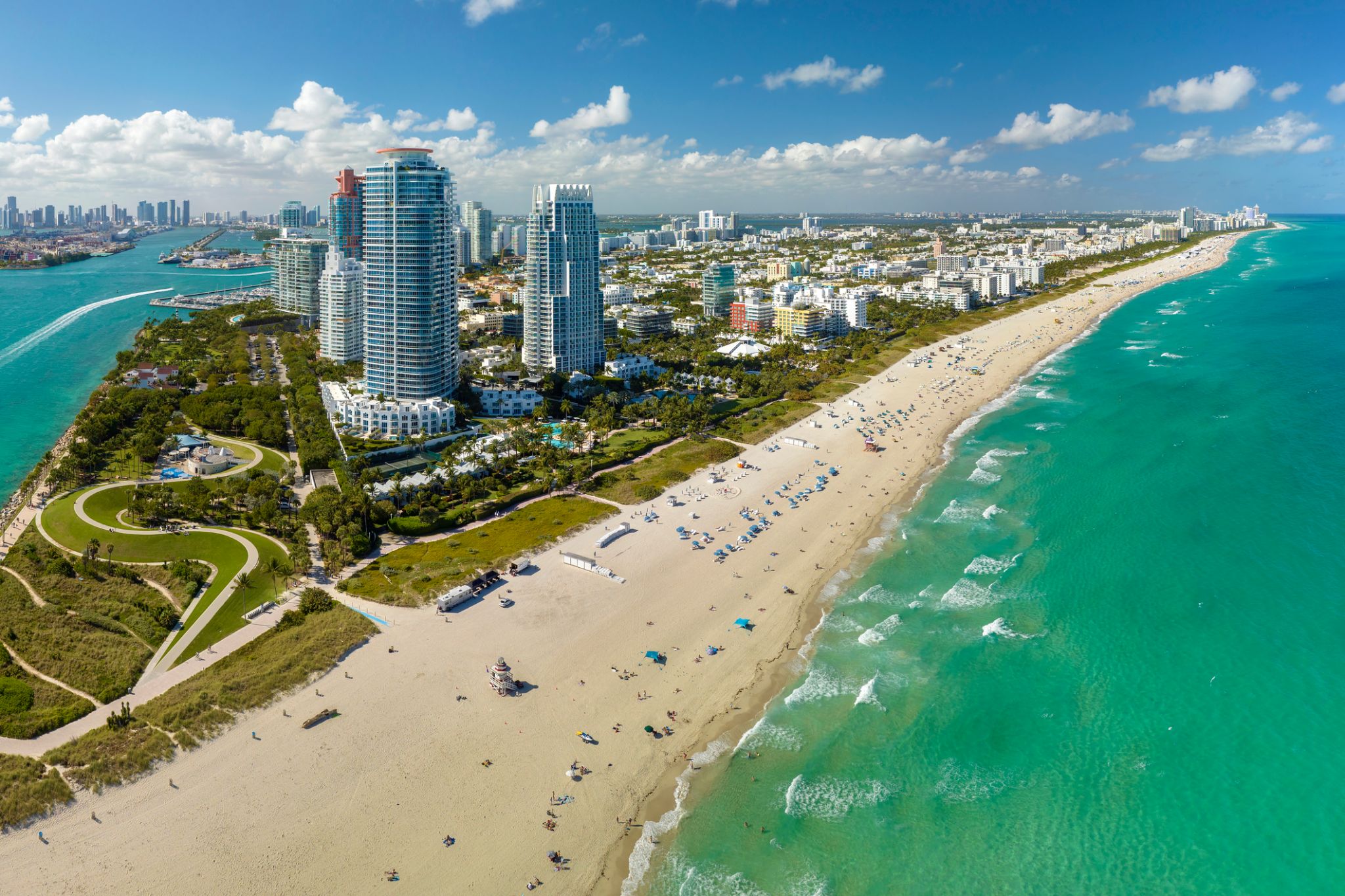
Miami, officially the City of Miami, is the cultural, economic and financial center of South Florida. Miami is the seat of Miami-Dade County, the most populous county in Florida. The city covers an area of about 56.6 square miles (147 km2), between the Everglades to the west and Biscayne Bay on the east; with a 2017 estimated population of 463,347, Miami is the sixth most densely populated major city in the United States. The Miami metropolitan area is home to 6.1 million people and the seventh-largest metropolitan area in the nation. Miami's metro area is the second-most populous metropolis in the southeastern United States and fourth-largest urban area in the U.S.
Miami is a major center, and a leader in finance, commerce, culture, media, entertainment, the arts, and international trade. The Miami Metropolitan Area is by far the largest urban economy in Florida and the 12th largest in the United States with a GDP of $344.9 billion as of 2017. In 2012, Miami was classified as an "Alpha−" level world city in the World Cities Study Group's inventory. In 2010, Miami ranked seventh in the United States and 33rd among global cities in terms of business activity, human capital, information exchange, cultural experience, and political engagement. In 2008, Forbes magazine ranked Miami "America's Cleanest City", for its year-round good air quality, vast green spaces, clean drinking water, clean streets, and citywide recycling programs. According to a 2009 UBS study of 73 world cities, Miami was ranked as the richest city in the United States, and the world's seventh-richest city in terms of purchasing power. Miami is nicknamed the "Capital of Latin America" and is the largest city with a Cuban-American plurality.
Greater Downtown Miami has one of the largest concentrations of international banks in the United States, and is home to many large national and international companies. The Civic Center is a major center for hospitals, research institutes, medical centers, and biotechnology industries. For more than two decades, the Port of Miami, known as the "Cruise Capital of the World", has been the number one cruise passenger port in the world. It accommodates some of the world's largest cruise ships and operations, and is the busiest port in both passenger traffic and cruise lines. Metropolitan Miami is also a major tourism hub in the southeastern U.S. for international visitors, ranking number two in the country after New York City.
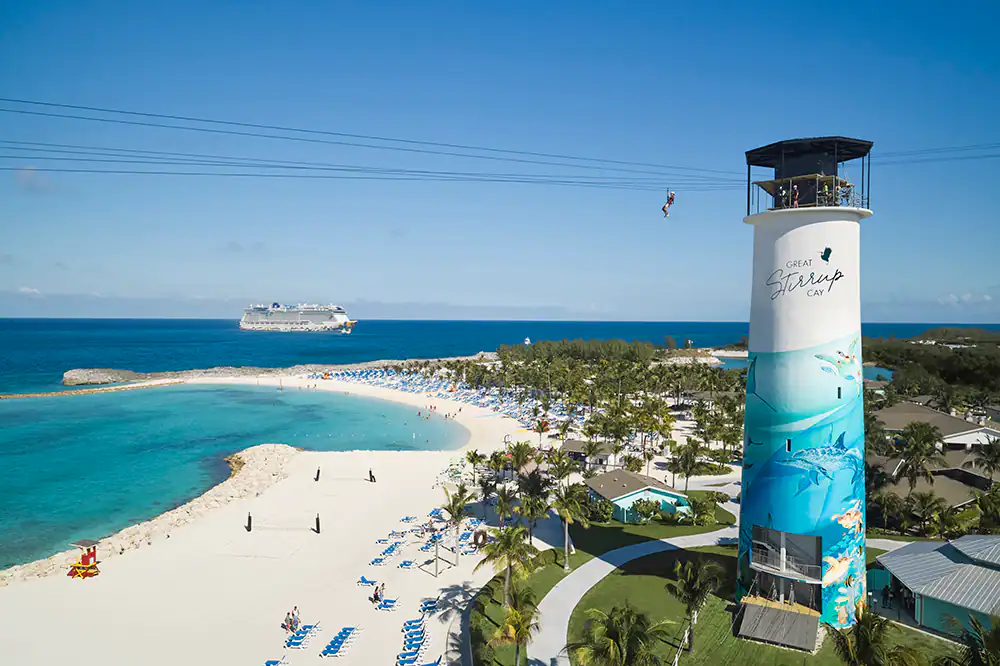
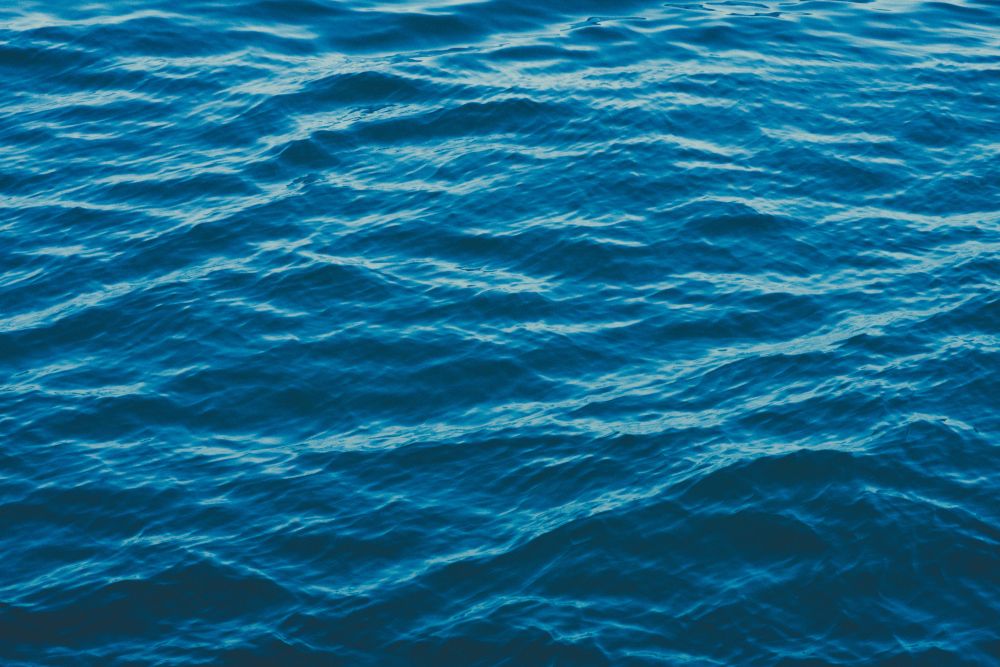

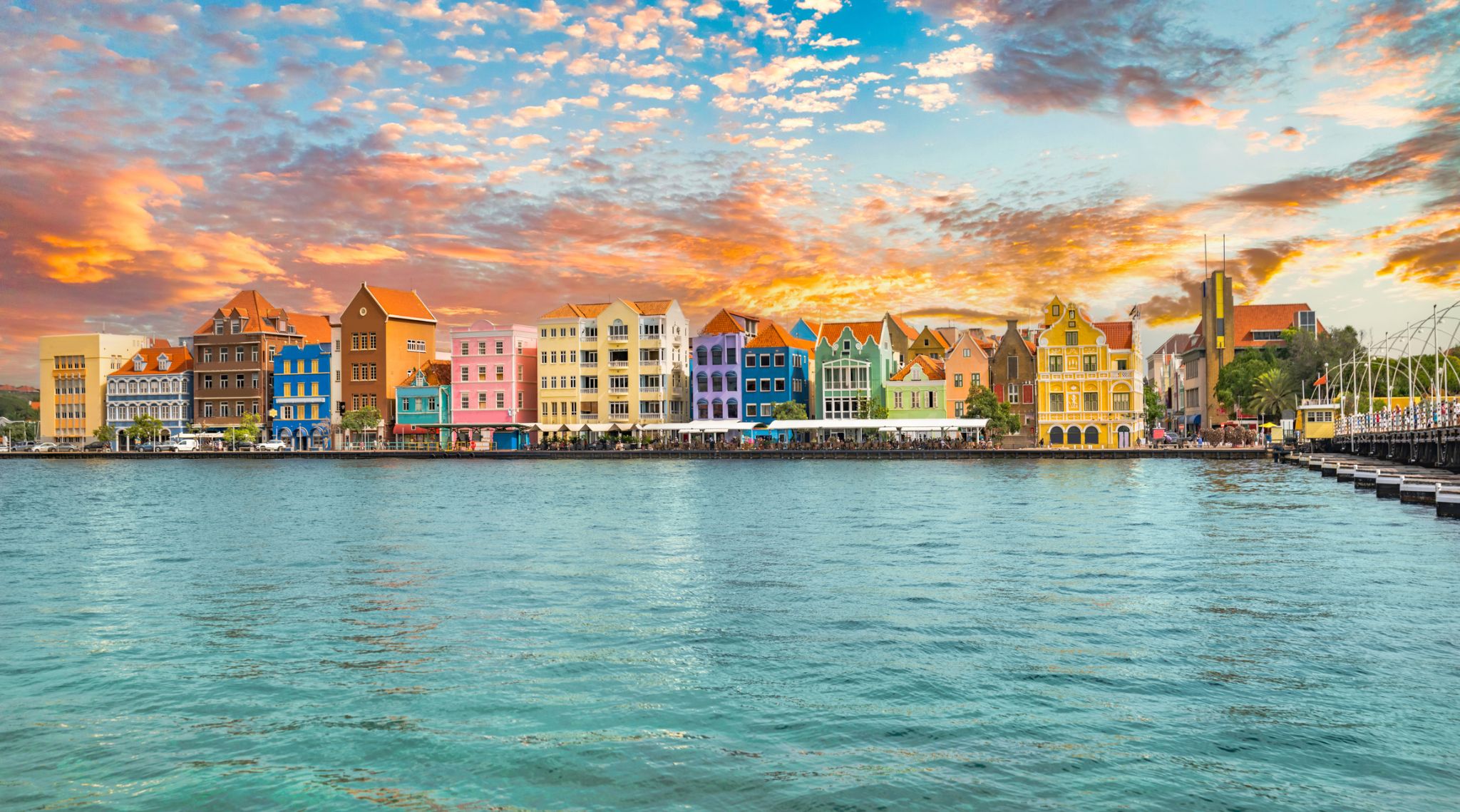
Curaçao is a Lesser Antilles island in the southern Caribbean Sea and the Dutch Caribbean region, about 65 km (40 mi) north of the Venezuelan coast. It is a constituent country (Dutch: land) of the Kingdom of the Netherlands.

Aruba is an island and a constituent country of the Kingdom of the Netherlands in the southern Caribbean Sea, located about 1,600 kilometres (990 mi) west of the main part of the Lesser Antilles and 29 kilometres (18 mi) north of the coast of Venezuela. It measures 32 kilometres (20 mi) long from its northwestern to its southeastern end and 10 kilometres (6 mi) across at its widest point. Together with Bonaire and Curaçao, Aruba forms a group referred to as the ABC islands. Collectively, Aruba and the other Dutch islands in the Caribbean are often called the Dutch Caribbean.
Aruba is one of the four countries that form the Kingdom of the Netherlands, along with the Netherlands, Curaçao, and Sint Maarten; the citizens of these countries are all Dutch nationals. Aruba has no administrative subdivisions, but, for census purposes, is divided into eight regions. Its capital is Oranjestad.
Unlike much of the Caribbean region, Aruba has a dry climate and an arid, cactus-strewn landscape. This climate has helped tourism as visitors to the island can reliably expect warm, sunny weather. It has a land area of 179 km2(69.1 sq mi) and is densely populated, with a total of 102,484 inhabitants at the 2010 Census. It lies outside Hurricane Alley.
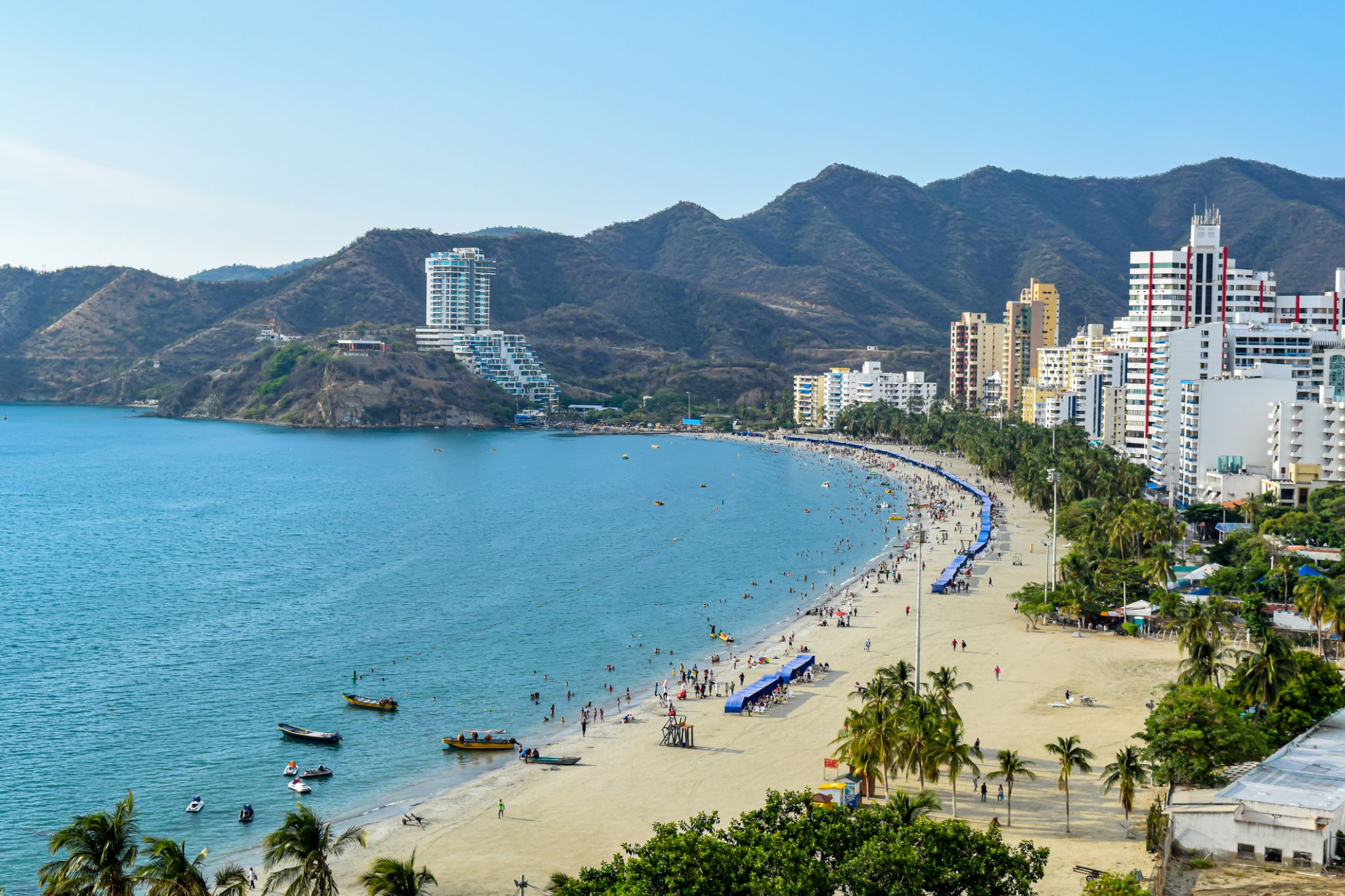
Golden beaches, tropical forests, and mountains that drop straight into the sea — all of this makes Santa Marta one of Colombia’s most diverse and scenic destinations. Founded in 1525, the city is the oldest colonial port in South America and still preserves the charm of its Spanish heritage, especially in the narrow streets and central plazas.
Santa Marta is the gateway to the Sierra Nevada de Santa Marta, the world’s highest coastal mountain range. Here, travelers can enjoy a unique blend of beach relaxation and jungle adventure: from hiking in Tayrona National Park to discovering the culture of the indigenous Kogi people. This city is perfect for those seeking not only sun and sea but also the true Latin American spirit.
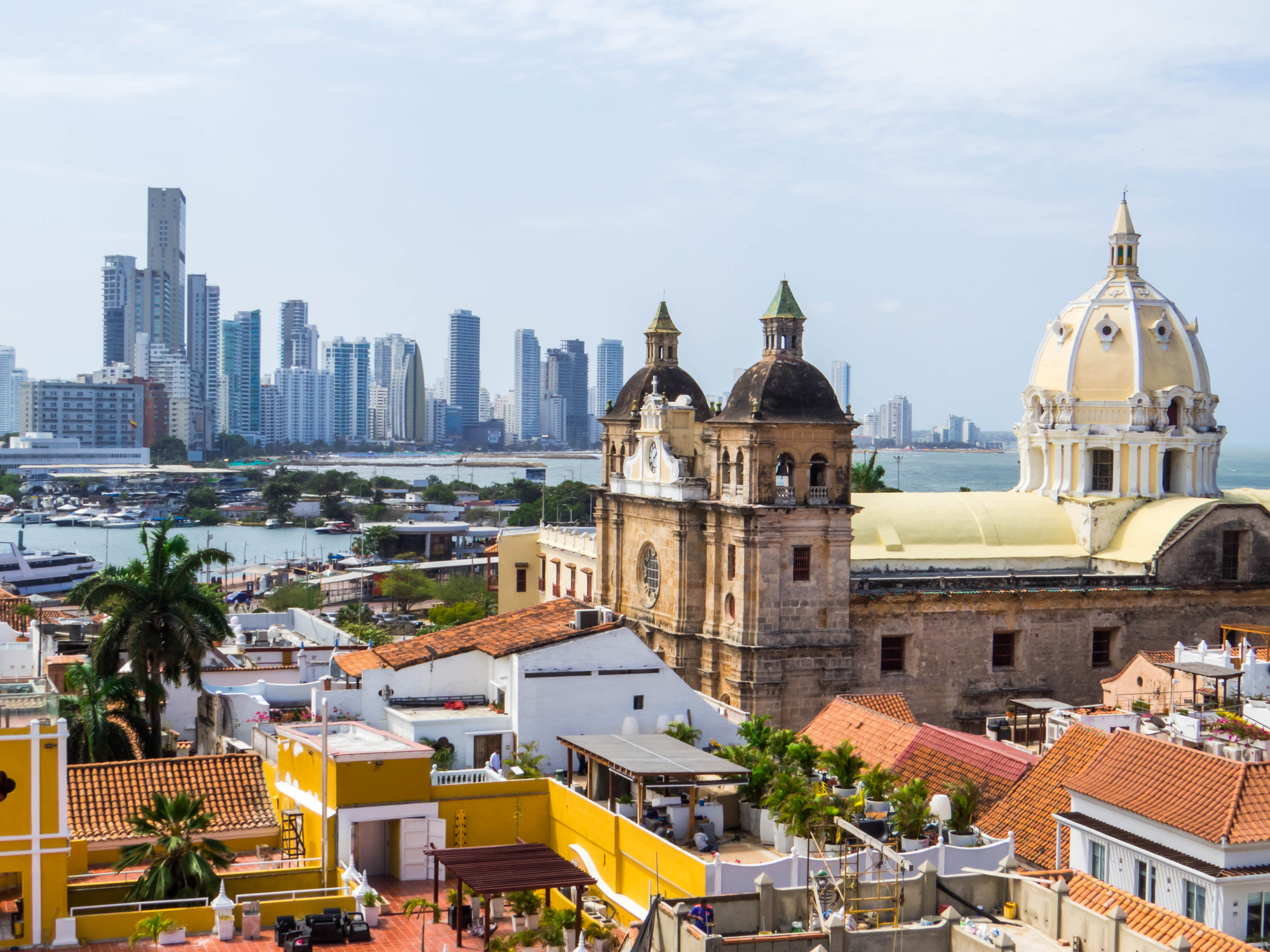
Ancient fortress walls, street musicians, and the Caribbean sun create an unforgettable atmosphere in Cartagena (Bolívar) — the gem of Colombia's coast. This city, listed as a UNESCO World Heritage Site, enchants visitors with its colonial architecture, charming courtyards, and the aroma of fresh coffee wafting from countless cafés.
Immerse yourself in the vibrant rhythm of Cartagena, strolling through the cobbled streets of the Old Town, where every corner holds tales of pirates and Spanish conquistadors. And the sunset near the ancient Castillo San Felipe de Barajas is the perfect ending to a day filled with culture, history, and tropical romance.


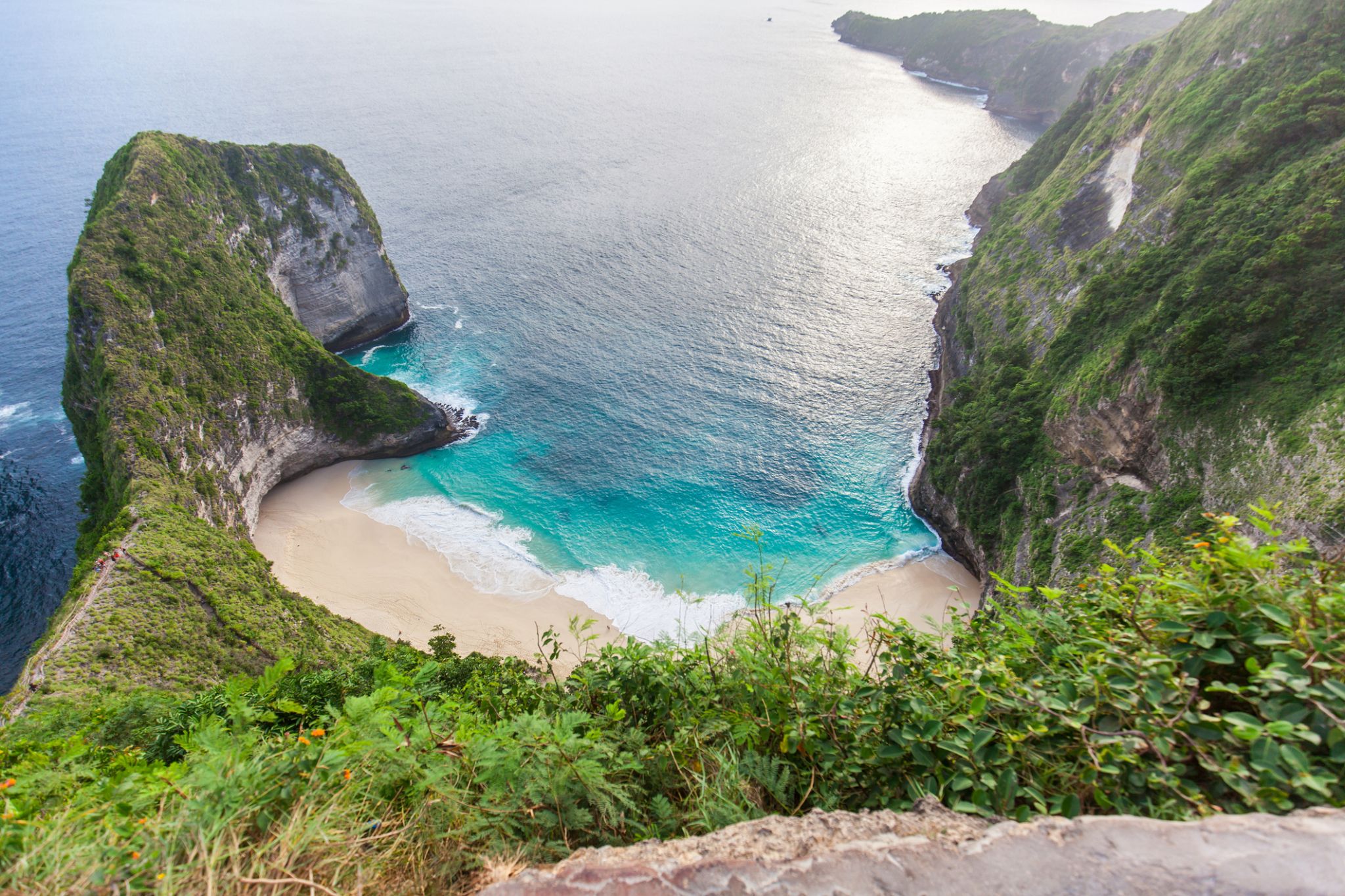
Manta
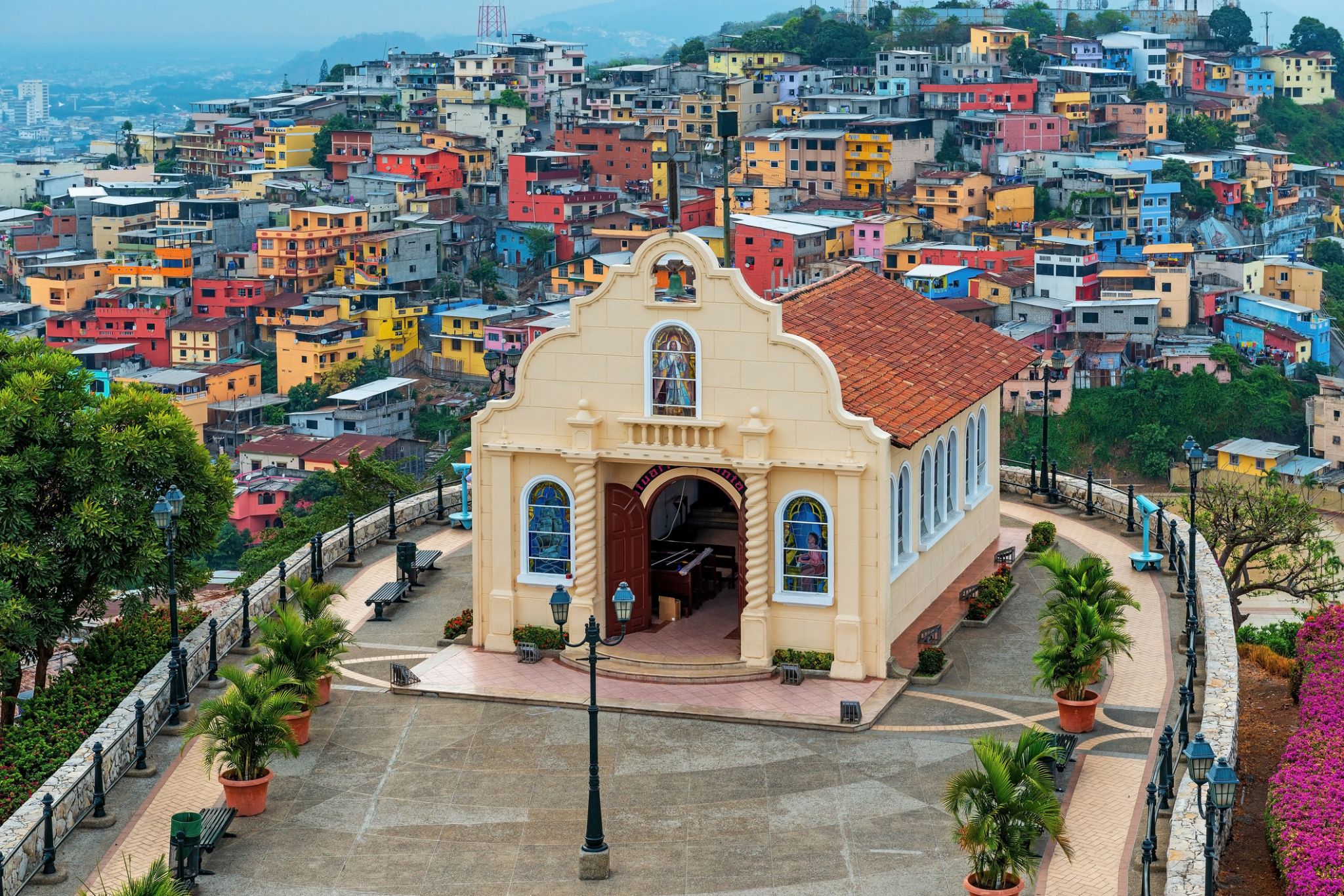
The city is the capital of Guayas Province and the seat of Guayaquil canton.
Guayaquil is on the west bank of the Guayas River, which flows into the Pacific Ocean at the Gulf of Guayaquil.

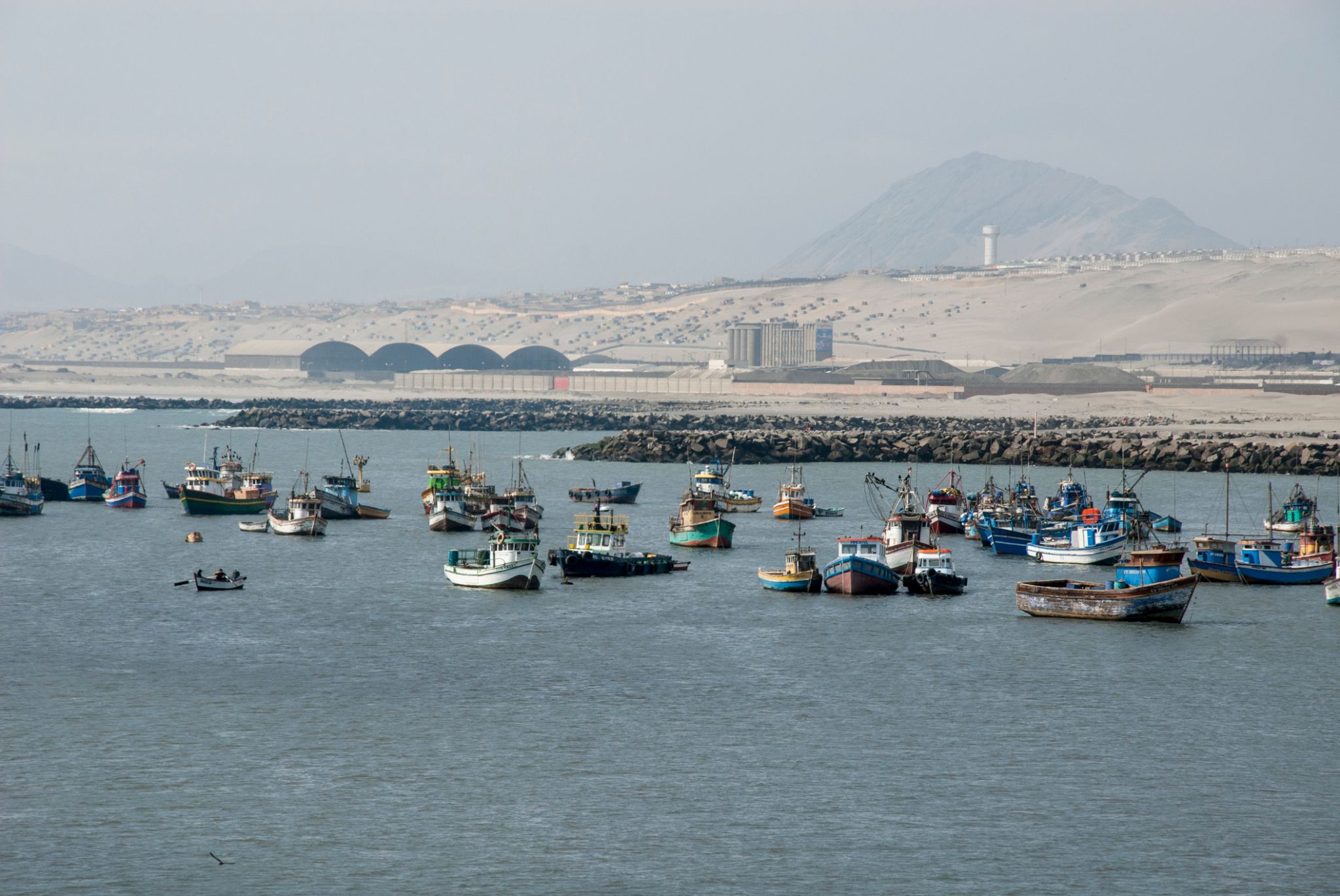
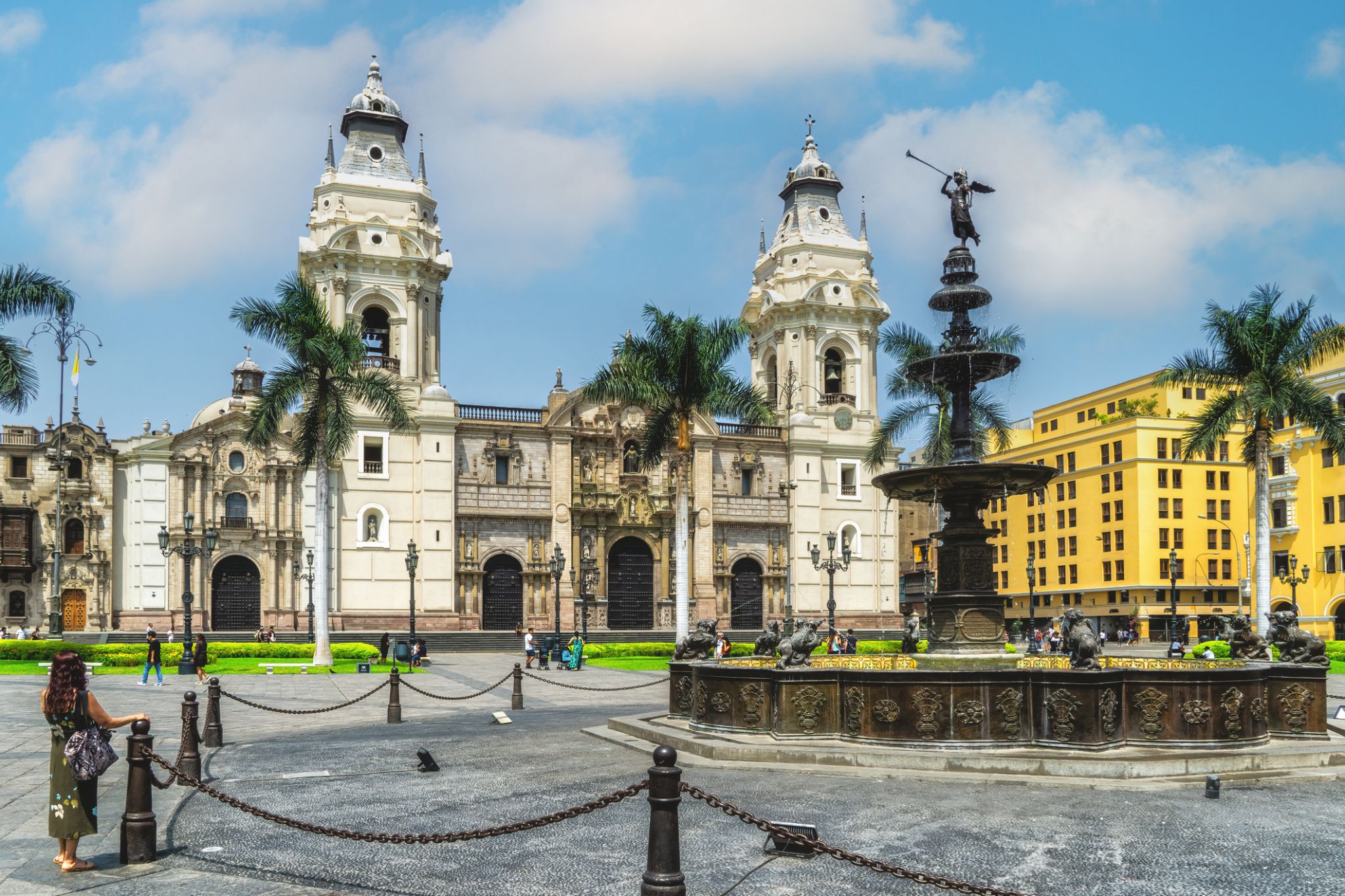
Lima is the capital and the largest city of Peru. It is located in the valleys of the Chillón, Rímac and Lurín rivers, in the central coastal part of the country, overlooking the Pacific Ocean. Together with the seaport of Callao, it forms a contiguous urban area known as the Lima Metropolitan Area. With a population of more than 9 million, Lima is the most populous metropolitan area of Peru and the third-largest city in the Americas (as defined by "city proper"), behind São Paulo and Mexico City.
Lima was founded by Spanish conquistador Francisco Pizarro on January 18, 1535, as Ciudad de los Reyes. It became the capital and most important city in the Viceroyalty of Peru. Following the Peruvian War of Independence, it became the capital of the Republic of Peru. Around one-third of the national population lives in the metropolitan area.

Lima is the capital and the largest city of Peru. It is located in the valleys of the Chillón, Rímac and Lurín rivers, in the central coastal part of the country, overlooking the Pacific Ocean. Together with the seaport of Callao, it forms a contiguous urban area known as the Lima Metropolitan Area. With a population of more than 9 million, Lima is the most populous metropolitan area of Peru and the third-largest city in the Americas (as defined by "city proper"), behind São Paulo and Mexico City.
Lima was founded by Spanish conquistador Francisco Pizarro on January 18, 1535, as Ciudad de los Reyes. It became the capital and most important city in the Viceroyalty of Peru. Following the Peruvian War of Independence, it became the capital of the Republic of Peru. Around one-third of the national population lives in the metropolitan area.
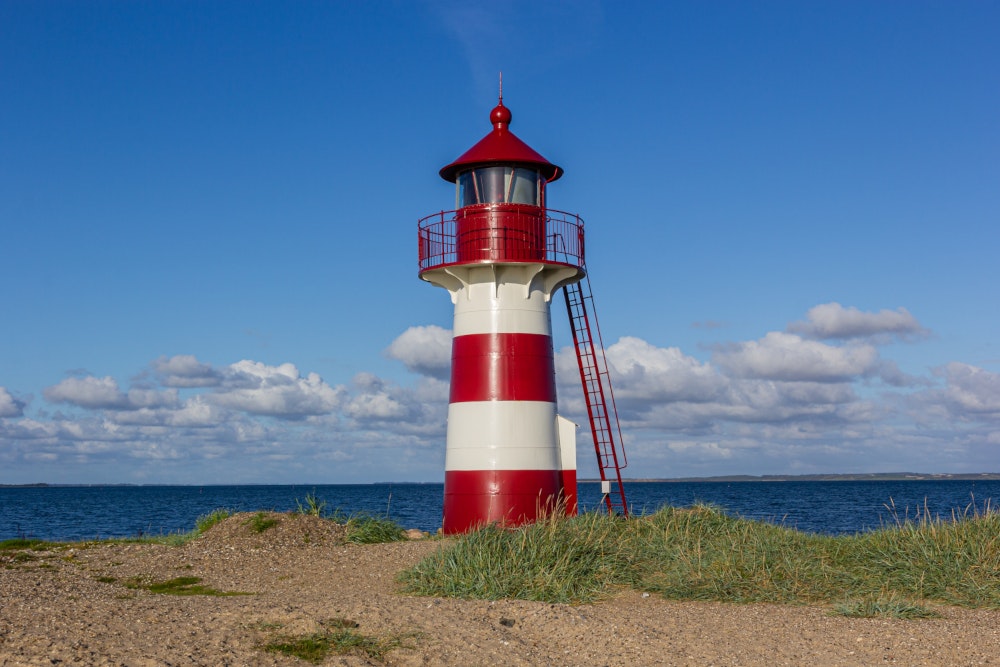


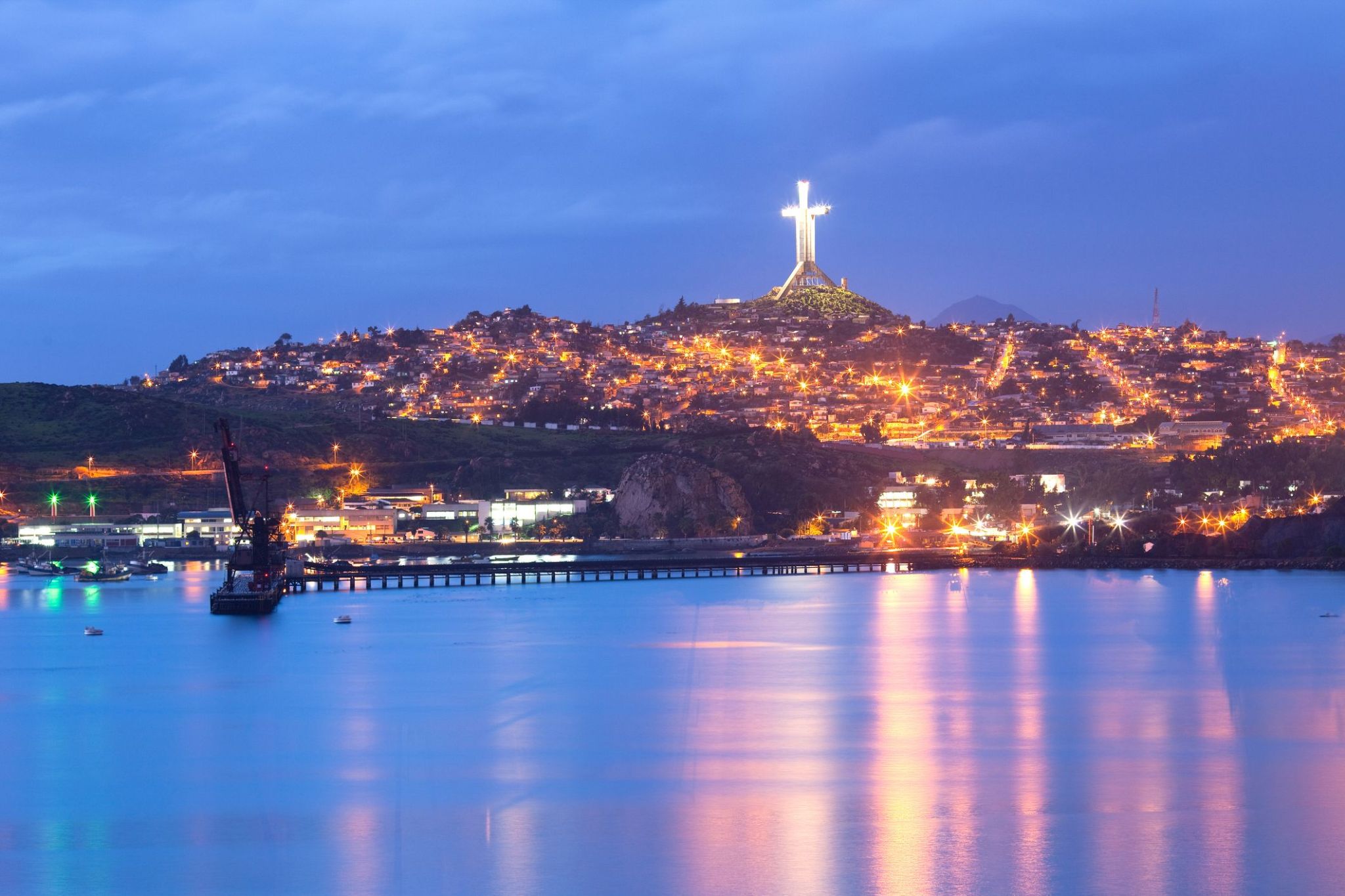
An unforgettable encounter with the Pacific coast awaits every traveler venturing into Coquimbo—a charming town where modernity and history intertwine in an extraordinary harmony. From the morning breeze by the bay to the luxurious sunsets over the port, this resort offers the true atmosphere of the Chilean coastline, where life flows at a gentle pace and every street is infused with the scent of the sea. Here you can savor fresh seafood at cozy restaurants or stroll along the elegant waterfront, soaking up the views and the cries of seagulls.
Coquimbo is also known for its historical and cultural landmarks: ancient churches, artisan markets, and contemporary art galleries create a unique blend of traditions and new experiences. Adventure lovers can explore the surrounding hills or discover the mysterious fortress—a testament to the city’s pirate-filled past. This city seems to invite every traveler to write their own chapter of an amazing story on the coast of Chile.


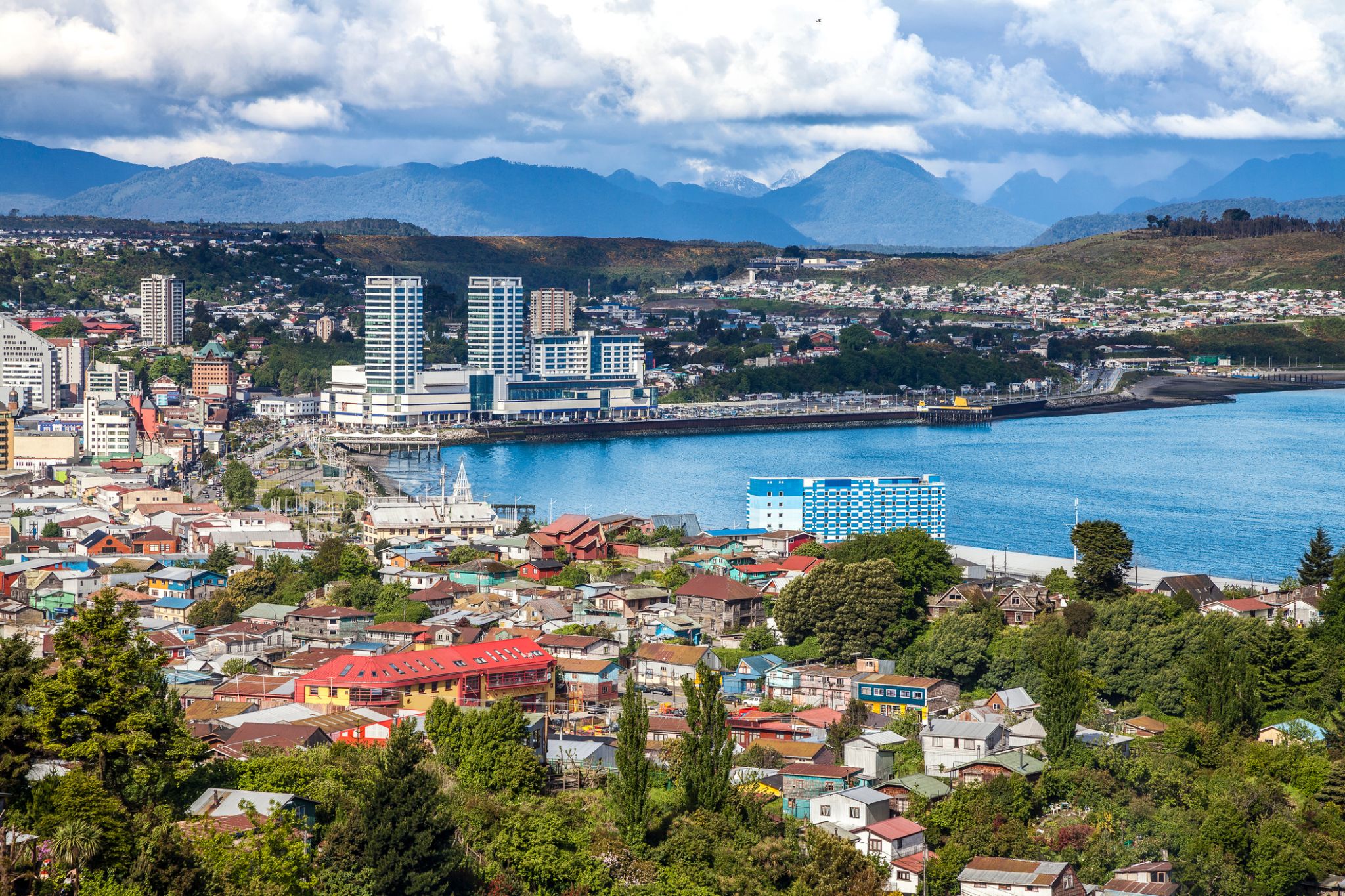
Puerto Montt is a port city and commune in southern Chile, located at the northern end of the Reloncaví Sound in the Llanquihue Province, Los Lagos Region, 1,055 km to the south of the capital, Santiago. The commune spans an area of 1,673 km2 (646 sq mi) and has a population of 245,902 in 2017. It is bounded by the communes of Puerto Varas to the north, Cochamó to the east and southeast, Calbuco to the southwest and Maullín and Los Muermos to the west.
Founded as late as 1853 during the German colonization of southern Chile, Puerto Montt soon outgrew older neighboring cities due to its strategic position at the southern end of the Chilean Central Valley being a gateway city into Chiloé Archipelago, Llanquihue and Nahuel Huapi lakes and Western Patagonia.
Puerto Montt has gained renown and grown significantly due to the rise of Chile as the second largest salmon producer of the world during the 1990s and 2000s. However, the Chilean salmon aquaculture crisis of the late 2000s resulted at least temporarily in severe unemployment and exposed weaknesses in the local economy. The city's cultural heritage mixes elements of Chiloé culture with German heritage although the city has attracted a significant number of newcomers from all over Chile in the last 30 years due to employment opportunities.
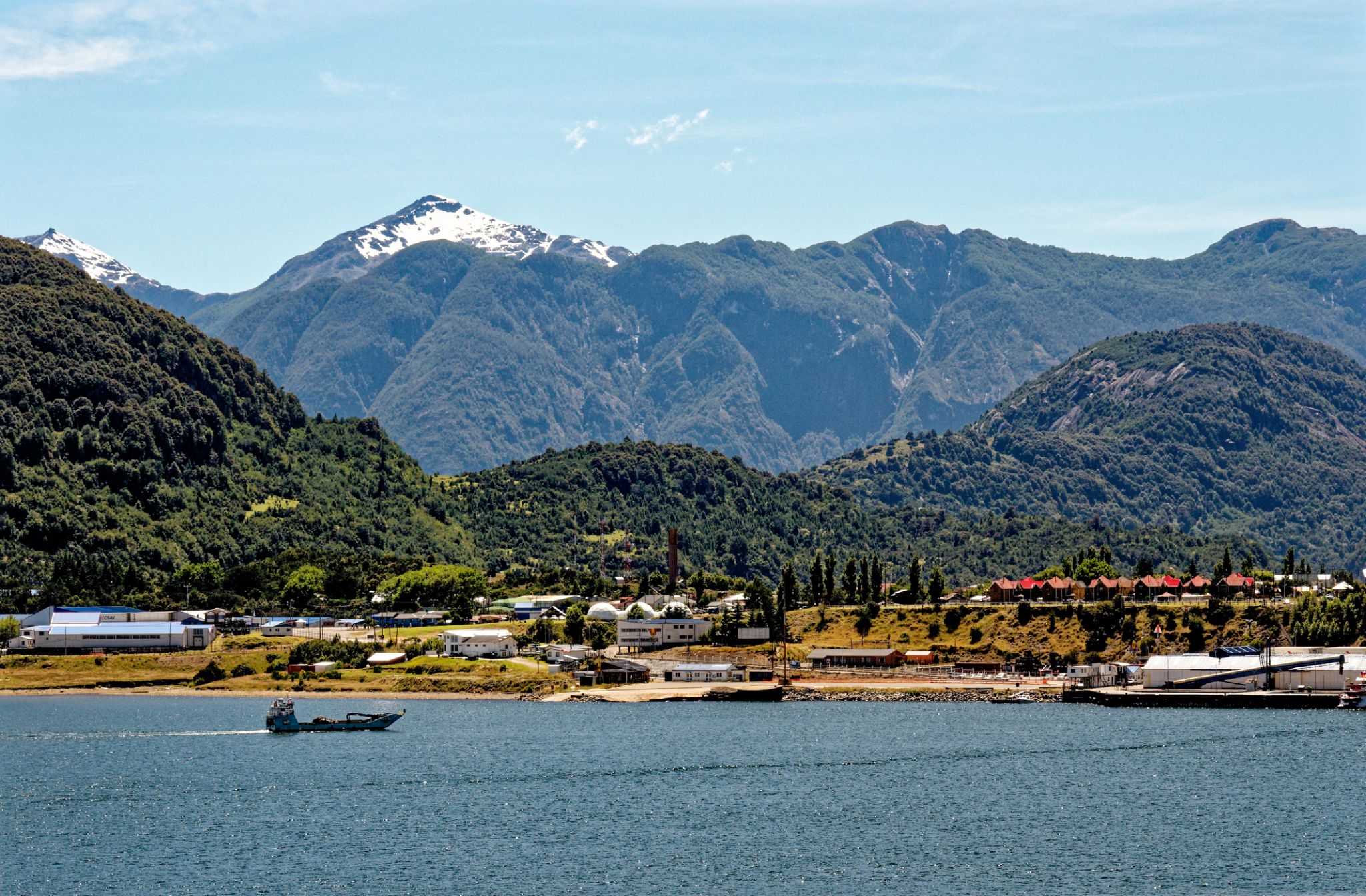



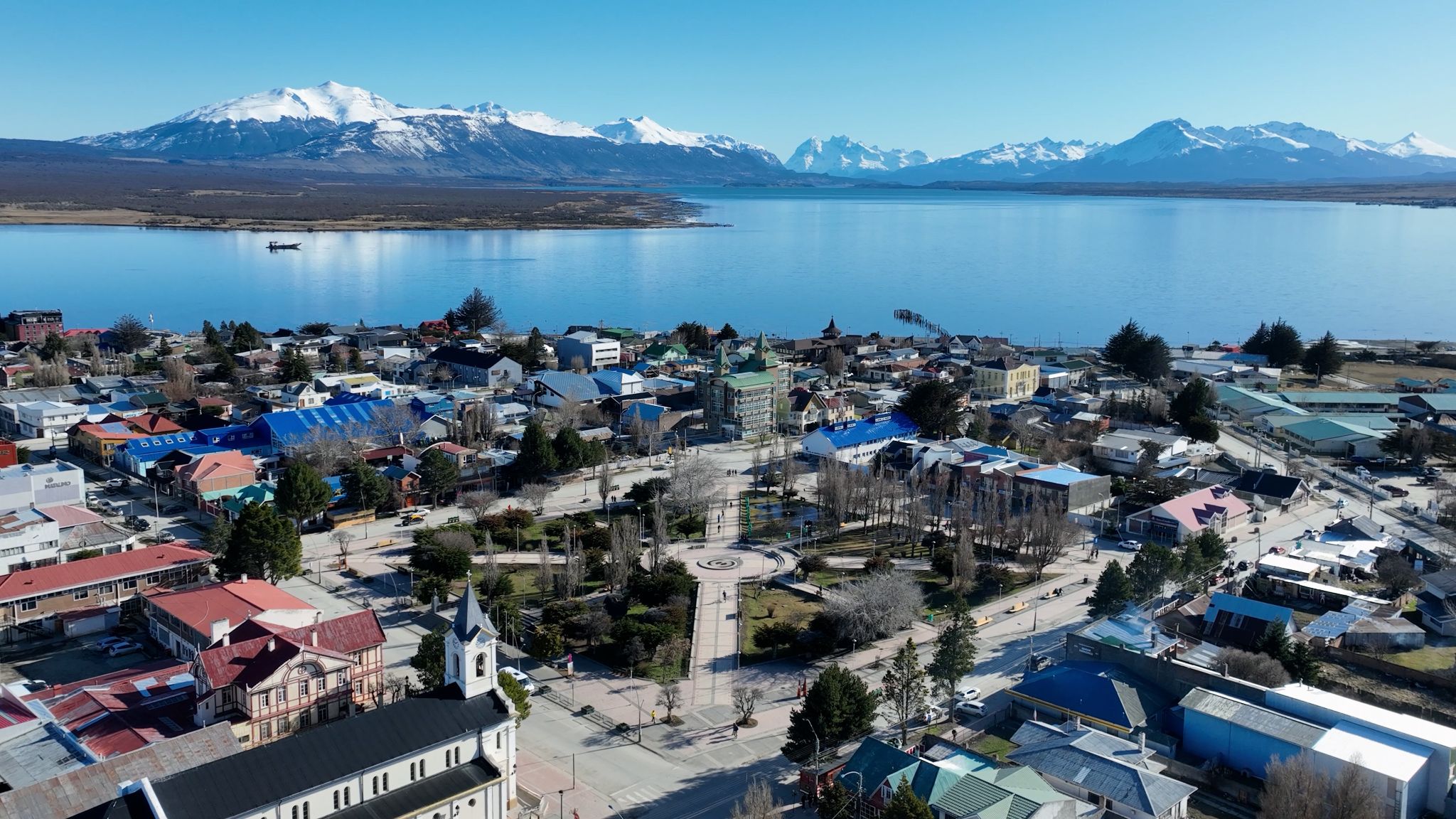

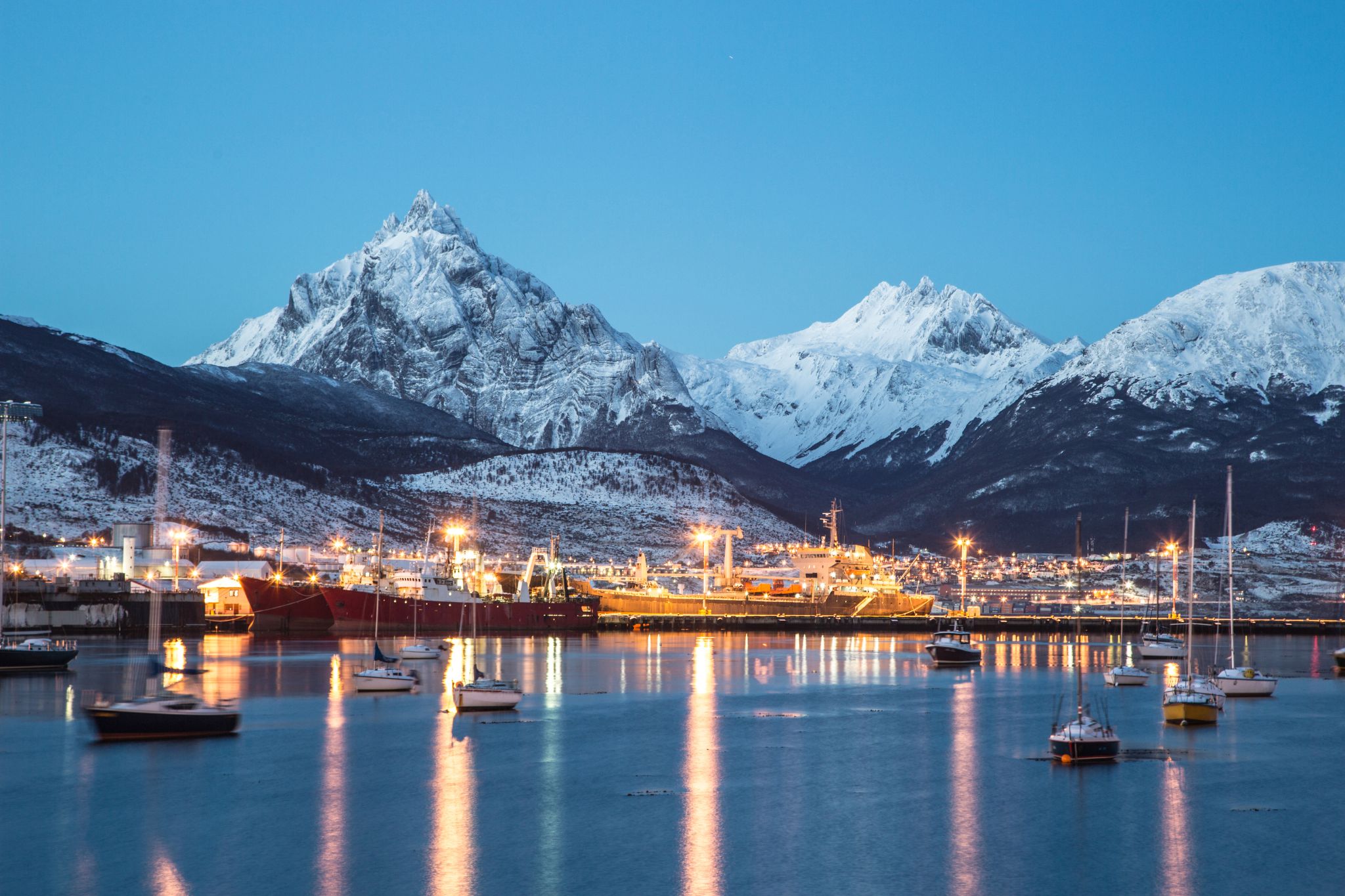
Ushuaia is the capital of Tierra del Fuego, Antártida e Islas del Atlántico Sur Province, Argentina. It is commonly regarded as the southernmost city in the world. Ushuaia is located in a wide bay on the southern coast of Isla Grande de Tierra del Fuego, bounded on the north by the Martial mountain range, and on the south by the Beagle Channel. It is the only municipality in the Department of Ushuaia, which has an area of 9,390 km2 (3,625 sq mi). It was founded October 12 of 1884 by Augusto Lasserreand is located on the shores of the Beagle Channel surrounded by the mountain range of the Martial Glacier, in the Bay of Ushuaia. Besides being an administrative center, it is a light industrial port and tourist hub.

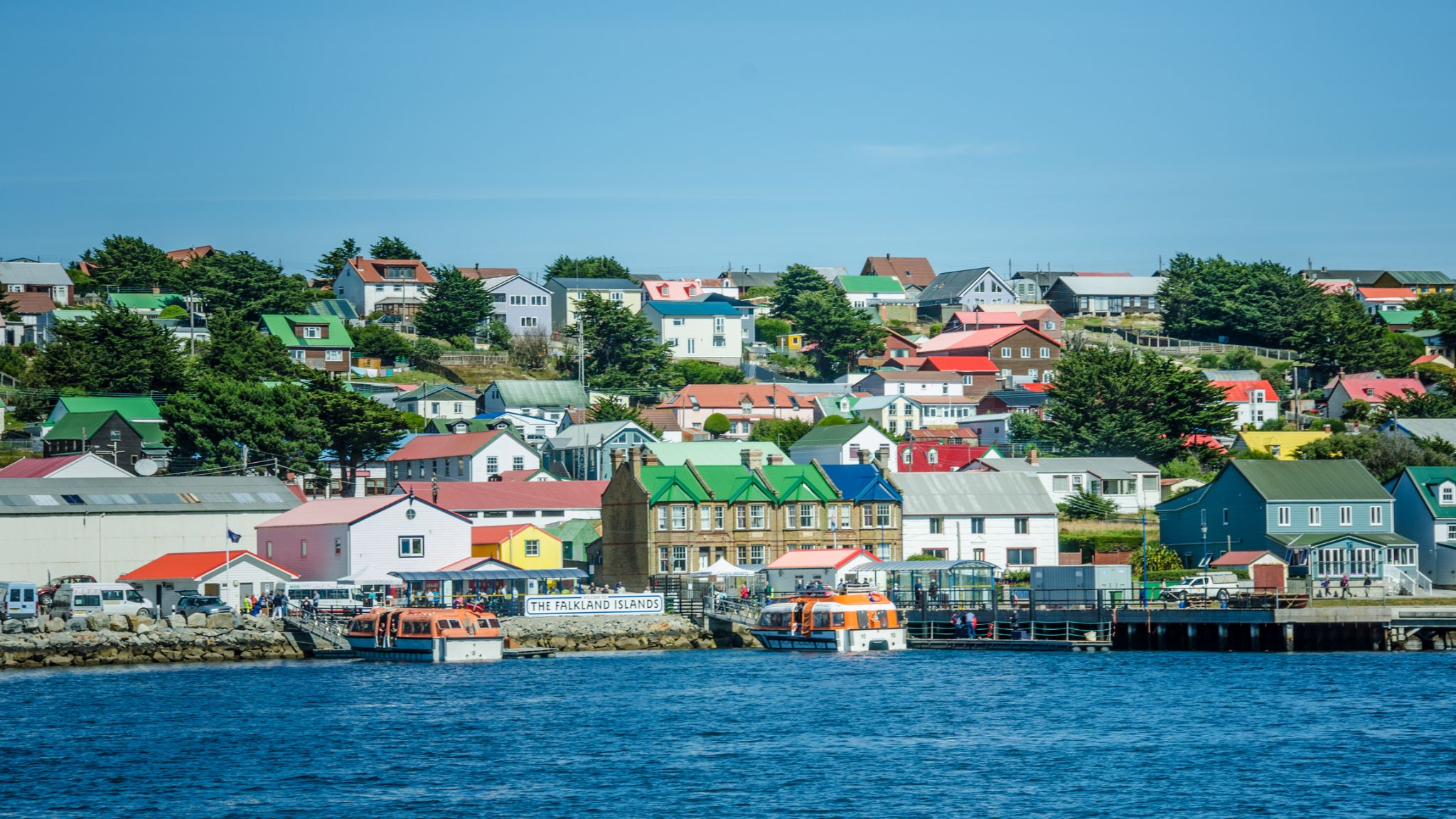
Stanley is the capital of the Falkland Islands. It is located on the island of East Falkland, on a north-facing slope in one of the wettest parts of the islands. At the 2016 census, the town had a population of 2,460 the entire population of the Falkland Islands was 3,398 on Census Day on 9 October 2016
Stanley is represented by five members of the Legislative Assembly of the Falkland Islands, currently Stacy Bragger, Barry Elsby, Mark Pollard, Roger Spink and Leona Vidal Roberts.
Stanley is the main shopping centre on the islands and the hub of East Falkland's road network. Attractions include the Falkland Islands Museum, Government House – built in 1845 and home to the Governor of the Falkland Islands – and a golf course, as well as a whale-bone arch, a totem pole, several war memorials and the shipwrecks in its harbour. The Falkland Islands Company owns several shops. Stanley has four pubs, 11 hotels and guesthouses, three restaurants, a fish and chip shop and the main tourist office. There are three churches, including the Anglican Christ Church Cathedral, the southernmost Anglican cathedral in the world, and the Roman Catholic St. Mary's Church. A bomb disposal unit in the town is a legacy of the Falklands War.
The town hall serves as a post office, philatelic bureau, law court and dance hall. The police station also contains the islands' only prison, with a capacity of 13 in the cells.
The community centre includes a swimming pool (the only public one in the islands), a sports centre, library, and school. A grass football pitch is located by the community centre and hosts regular games.
Stanley Racecourse, located on the west side of Stanley, holds a two-day horse racing meeting every year on 26 and 27 December. The Christmas races have been held here for over 100 years.
Stanley Golf Course has an 18-hole course and a club house. It is also located to the west of Stanley.
King Edward VII Memorial Hospital is the islands' main hospital, with doctors' practice and surgery, radiology department, dental surgery and emergency facilities.
Several bus and taxi companies operate out of Stanley.
Stanley is also home to the Falkland Islands Radio Station (FIRS), the Stanley office of the British Antarctic Survey, and the office of the weekly Penguin News newspaper.
A nursery and garden centre is also here, in whose greenhouses some of the islands' vegetables are grown.


Nestled on the shores of the Golfo Nuevo, Puerto Madryn invites travelers to witness some of the most unforgettable wildlife encounters in South America. Renowned as the gateway to the Valdés Peninsula—a UNESCO World Heritage Site—this coastal town offers the chance to spot Southern Right Whales from the beach, a truly unique spectacle that few places on Earth can match.
Beyond its marine wonders, Puerto Madryn boasts charming streets lined with artisan shops, cafes, and welcoming locals eager to share the region’s Patagonian traditions. With opportunities for snorkeling with sea lions, exploring rugged landscapes, and enjoying fresh seafood, it’s no wonder this destination continues to captivate nature lovers and adventurers alike.

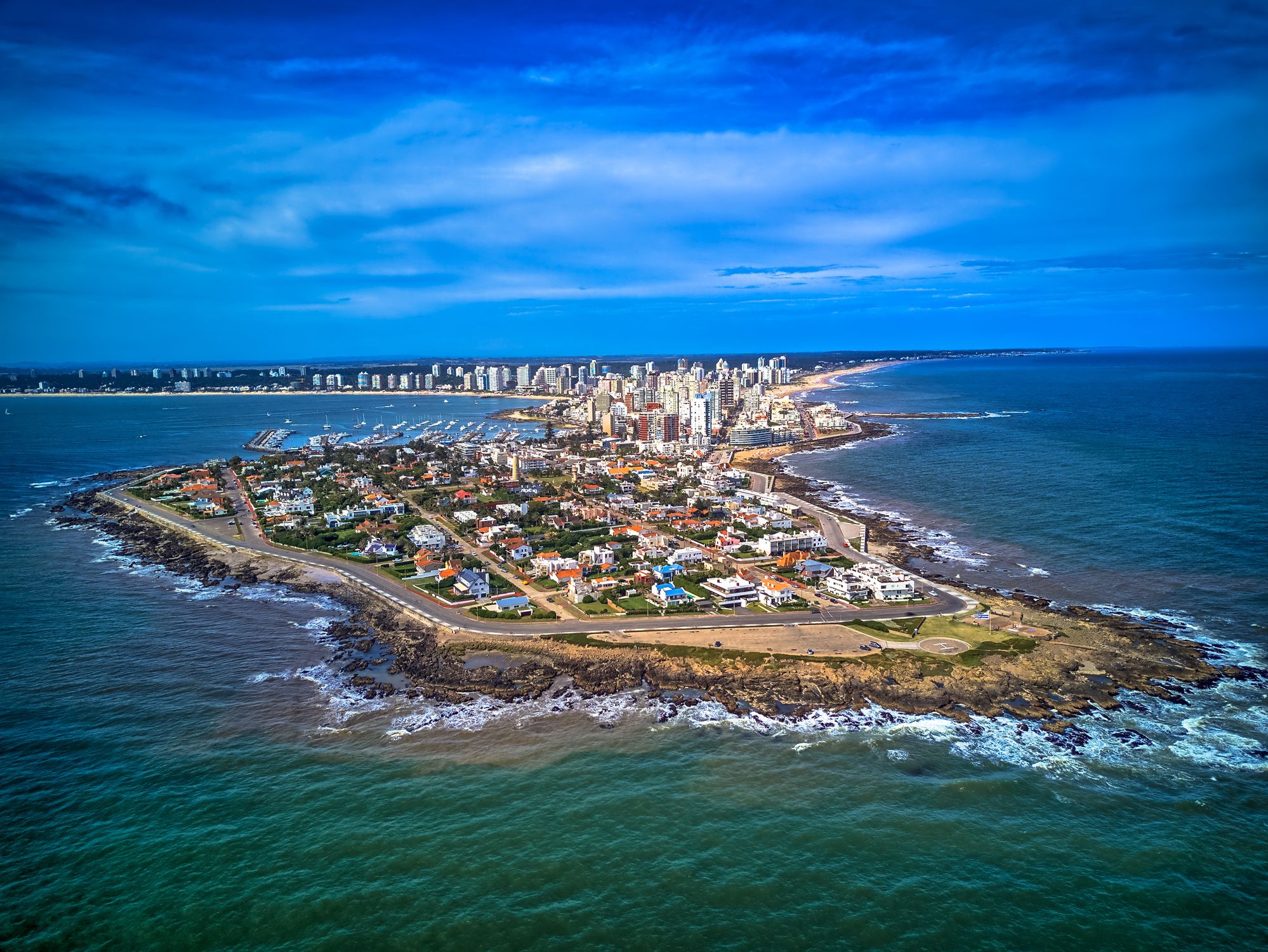
Punta del Este — Uruguay’s Premier Resort on the Atlantic Coast
Punta del Este is one of South America’s most renowned resort cities, located on Uruguay’s southern coast where the Atlantic Ocean meets the Río de la Plata estuary. The city is known for its unique contrasts—on one side, upscale neighborhoods with modern skyscrapers, yachts, and gourmet restaurants, and on the other, tranquil sandy beaches, scenic dunes, and surf-friendly waves. It’s often dubbed the “Monaco of South America” for its luxurious infrastructure and popularity among international celebrities.
Beyond the beaches, Punta del Este offers both cultural and natural attractions: the iconic “La Mano” sculpture, the Ralli Museum of contemporary art, and nearby islands home to sea lions. Visitors can explore the bohemian district of La Barra or enjoy sunset views by the Punta del Este lighthouse. The city comes alive during the summer season (December to February), when tourists from around the globe arrive in search of sunshine, comfort, and vibrant nightlife.
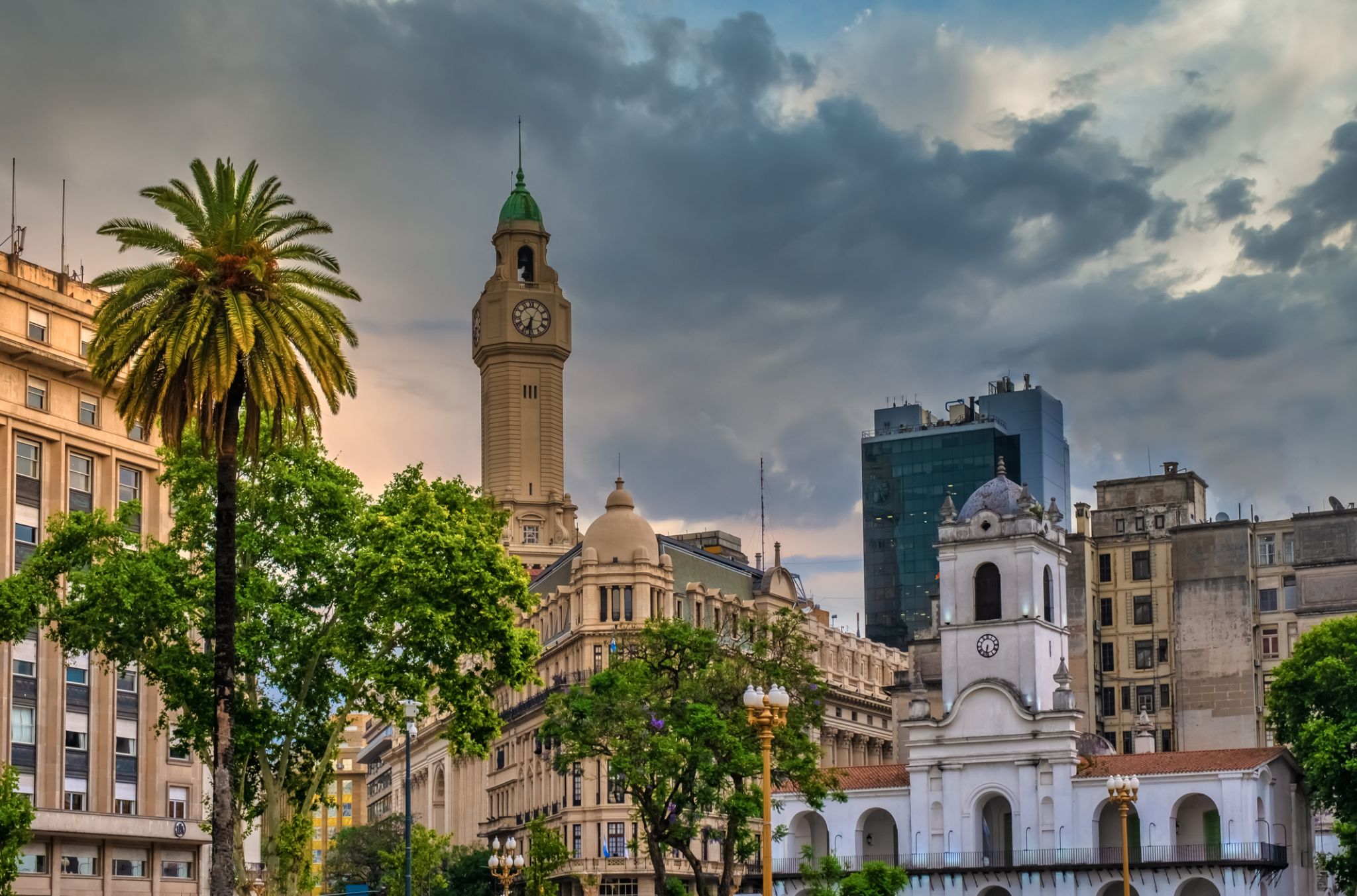
the capital city and chief port of Argentina, in the eastern central part of the country, on the Plata River; population 3,042,600 (est. 2008).